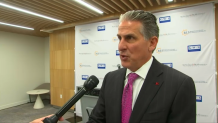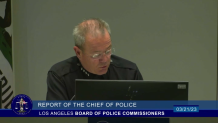The Los Angeles City Attorney's Office Wednesday sued a news reporter and the "Stop LAPD Spying Coalition," demanding the return and destruction of photographs and files released by the City that mistakenly included the pictures and names of some undercover LAPD officers.
The suit claims that despite the City's production and release of the files in response to a California Public Records Act request and lawsuit, an LA Superior Court judge should order the Knock-LA.com reporter, Ben Camacho, and members of the Coalition to give them back.
"The City seeks emergency judicial intervention to protect the lives of law enforcement officers currently serving in sensitive assignments whose identities were compromised by the inadvertent release of their photographs pursuant to a California Public Records Act response," the City said in its lawsuit.
Get top local stories in Southern California delivered to you every morning. >Sign up for NBC LA's News Headlines newsletter.
"To date, efforts to retrieve the photographs voluntarily have been rebuffed," the City wrote. The LA City Attorney's Office confirmed it filed the case but didn't offer additional detail.
Camacho declined to comment, citing the advice of his attorneys who were reviewing the complaint.
Hamid Khan, the co-founder of the Stop LAPD Spying Coalition, told NBCLA he was reviewing the suit and he was surprised the City had accused the group of, "willfully exposing," the information the Coalition was not entitled to access.
Local
Get Los Angeles's latest local news on crime, entertainment, weather, schools, COVID, cost of living and more. Here's your go-to source for today's LA news.
"Who made the decision about to what we're entitled," he said.
Last week the union that represents most LAPD officers said it filed a lawsuit against the City over the photo release, blaming the mistake on the police department's negligence and demanding the City take action to "claw back" the files and photos.
The Los Angeles Police Protective League also said it caused Twitter to suspend an account that purported to place a "bounty" on officers who's names and photos were made public in the disclosures.
The records were produced by the LAPD last year in response to public record act requests filed in 2021 and 2022.
Camacho, the first requester, went to court to obtain the records after the LAPD denied his initial request for photos.
The second requester was the Coalition, which asked for similar data in December 2022 and in March 2023, published the website "watchthewatchers.net," that allows users to search for any LAPD officer by name or serial number.
On Tuesday an attorney who said he represented more than 300 undercover officers told reporters that the photo release had already endangered officers, but he did not provide specific incidents or details.
"Several undercover officers have been threatened, with direct threats, requiring their families to move," attorney Matthew McNicholas said, and added that the officers had been confronted in person, on the street, and had been verbally threatened.

McNicholas filed a government claim against the City of Los Angeles seeking damages for the photo release, a required bureaucratic first step before a lawsuit can be filed.
The LAPD spokesperson also would not address McNicholas' allegations, citing the ongoing litigation.
Chief Michel Moore addressed the photo release again in a department-wide email sent to officers Wednesday, in which he asked officers to send an email message to headquarters if they were working in an undercover role.
"Apologies only go so far," Moore said in the email.
"While the investigation into the circumstances involved with the release of this information is ongoing, we cannot go back in time or change the past."
"We can, however, be better prepared for similar circumstances in the future," he said.
At the March 21 meeting of the Board of Police Commissioners, Moore said it wasn't clear how the mistake happened.

He said the department regularly provides information and documents in response to public records requests and removes non-public data, like the identities of undercover officers.
"We're not a secret police department," Moore said. "We don't operate behind anonymity, and at the same time, there are legitimate public safety and officers safety concerns."
It is not clear how many of the department's roughly 9,200 officers are currently undercover, or have recently worked in an undercover role, in part because many of those assignments are short-lived, such as when an officer uses an alias to communicate with a potential criminal.
One group of undercover officers was removed from the records release: those who work in the Special Operations Division of internal affairs. Those officers investigate and often surveil other LAPD officers or employees suspected of wrongdoing, and once assigned to the unit, have their names removed from many department records to protect their identities.
McNicholas said he filed the claim on behalf of 321 officers and expected dozens more to be included in the case.
A search of LAPD crime data Wednesday showed no records of officers reporting they had been threatened by a member of the public so far this year.
The department's public crime data portal, which allows searches of limited information gleaned from crime reports, includes 247 reports that list LAPD officers as the victims of a crime in 2023.
None of the reports documented threats of violence against officers, rather the 247 included incidents like assault, resisting arrest, and battery.
An LAPD spokesperson declined to discuss whether or not threats had been reported by officers.



